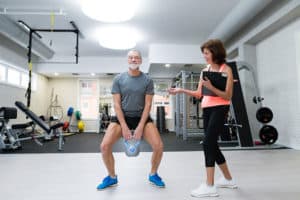The most recent comprehensive research analysis from hundreds of studies finds three practices may reduce cognitive decline.
Strong evidence that anything prevents Alzheimer’s disease is lacking, but a few changes can likely delay memory loss, according to a 2017 review by the National Academies of Sciences, Engineering and Medicine.
Specific memory training, consistent exercise and controlling high blood pressure offer the best hope, the committee concluded. Members examined the best research on ways to limit or prevent cognitive impairment, the loss of ability to think clearly and make decisions,that often afflicts older adults.
The number of Americans with Alzheimer’s is more than 5 million, and growing as the overall population ages. Treatments such as Aricept (donezepil) and Namenda boost working brain cells with unaffected neurons, but there is no cure.
Cognitive Training, Exercise and Blood Pressure Control
“Even though clinical trials have not conclusively supported the three interventions discussed in our report, the evidence is strong enough to suggest the public should at least have access to these results to help inform their decisions about how they can invest their time and resources to maintain brain health with aging,” said Dr. Alan Leshner, chair of the committee and CEO emeritus of the American Association for the Advancement of Science.
“The strongest evidence was in the area of cognitive training,” Petersen said.
Do crossword puzzles or Sudoku qualify? They won’t hurt, but studies show gains from specialized training called mnemonic strategies.
Mnemonic memory programs include face-name recognition and name-face learning, number mnemonics, story mnemonics, and the method of loci, where key details are kept along a familiar route or place you recall.
Additionally, training programs often entail instruction on how to take advantage of environmental supports, called external memory aids.
“Can you, in fact, find a new way to try to remember a list of grocery items?” Peterson asked. Also, try figuring out restaurant tips in your head, he advised, instead of using a calculator or your smartphone.
Commercial products have not proven they help, Petersen cautioned. See sidebar for information about common commercial brain games.
Exercise Helps Your Aging Brain
Several studies indicate that exercise is important.
“Here we're talking about modest aerobic exercise,” Petersen said. Brisk walking and cycling are good choices.
“How much? Maybe 150 minutes a week—30 minutes five times, 50 minutes three times—can have an effect on reducing cognitive impairment later in life,” Petersen said.
A preponderance of documentation demonstrates the health benefits of physical activity. Some of these benefits, such as stroke prevention, are causally related to brain health.
“Is it going to prevent Alzheimer's disease?” asked Peterson. “I can't say that. But I think it may have an effect on reducing cognitive impairment.”
Control Blood Pressure to Help Brain Function
Managing hypertension by controlling blood pressure seems to delay vascular dementia, according to the committee. High blood pressure damages delicate blood vessels in the brain.
Controlling blood pressure is particularly important during midlife, from ages 35 to 65. There is also strong evidence that using antihypertensive medications and making lifestyle changes to manage blood pressure can help prevent stroke and cardiovascular disease.
Conclusions
None of the evidence is strong enough to justify a public education campaign, the committee of experts found. But it did point to the need for more and larger randomized, controlled research.
“We’re all urgently seeking ways to prevent dementia and cognitive decline with age,” said Dr. Richard Hodes, director of the National Institute on Aging.
________________________________________
Sources:
“Interventions to prevent cognitive decline, dementia,” ScienceDaily.
“More Bad News For Brain-Training Games,” NPR.
“No Effect of Commercial Cognitive Training on Neural Activity During Decision-Making,” Journal of Neuroscience.
“What Can Prevent Alzheimer’s? Here’s What the Evidence Shows,” NBC News.
“Memory training interventions for older adults: A meta-analysis,” National Center for Biotechnology Information.
“Lifestyle Program May Slow Cognitive Decline,” American Academy of Neurology.
“A 2 year multidomain intervention of diet, exercise, cognitive training, and vascular risk monitoring versus control to prevent cognitive decline in at-risk elderly people (FINGER): a randomised controlled trial,” The Lancet Journals.
Blog posting provided by Society of Certified Senior Advisors
www.csa.us

